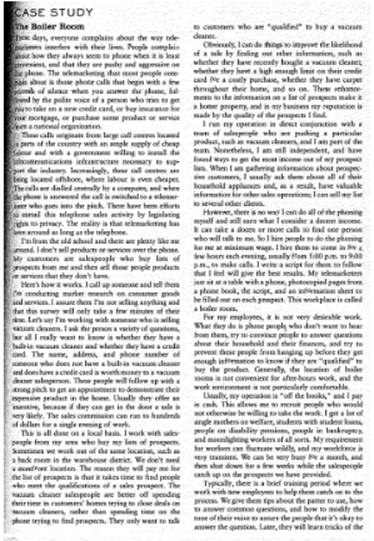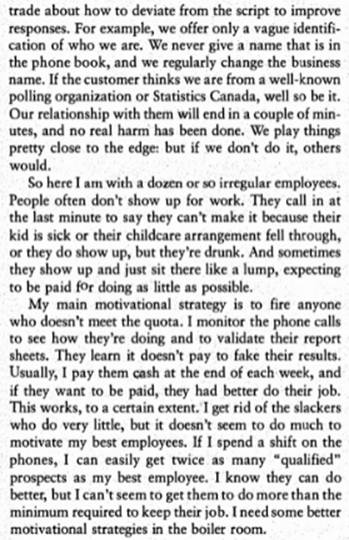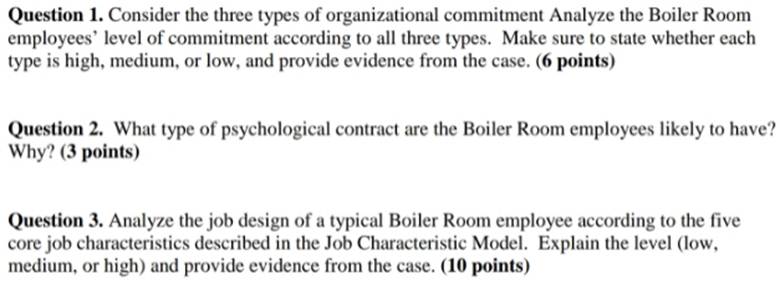To customers who are “qualified” to buy a vacuum cleaner.
CASE STUDY: The Boiler Room These days, everyone complains about the way tele- marketers interfere with their lives. People complain about how they always seem to phone when it is least convenient, and that they are pushy and aggressive on the phone. The telemarketing that most people com- plain about is those phone calls that begin with a few seconds of silence when you answer the phone, fol- lowed by the polite voice of a person who tries to get you to take on a new credit card, or buy insurance for your mortgage, or purchase some product or service from a national organization. These calls originate from large call centres located in parts of the country with an ample supply of cheap labour and with a a government willing to install the telecommunications infrastructure necessary to sup- port the industry. Increasingly, these call centres are being located offshore, where labour is even cheaper. The calls are dialled centrally by a computer, and when the phone is answered the call is switched to a telemar- keter who goes into the pitch. There have been efforts to curtail this telephone sales activity by legislating rights to privacy. The reality is that telemarketing has been around as long as the telephone. I'm from the old school and there plenty like me around. I don't sell products or services over the phone. My customers are salespeople who buy lists of prospects from me and then sell those people products or services that they don't have. Here's how it works. I call up someone and tell them I'm conducting market research on consumer goods and services. I assure them I'm not selling anything and that this survey will only take a few minutes of their time. Let's say I'm working with someone who is selling vacuum cleaners. I ask the person a variety of questions, but all I really want to know is whether they have a built-in vacuum cleaner and whether they have a credit card. The name, address, and phone number of someone who does not have a built-in vacuum cleaner and does have a credit card is worth money to a vacuum cleaner salesperson. These people will follow up with a strong pitch to get an appointment to demonstrate their expensive product in the home. Usually they offer an incentive, because if they can get in the door a sale is very likely. The sales commission can run to hundreds of dollars for a single evening of work. This is all done on a local basis. I work with sales- people from my area who buy my lists of prospects. Sometimes we work out of the same location, such as a back room in the warehouse district. We don't need a storefront location. The reason they will pay me for the list prospects is that it takes time to find people who meet the qualifications of a sales prospect. The vacuum cleaner salespeople are better off spending their time in customers' homes trying to close deals on vacuum cleaners, rather than spending time on the phone trying to find prospects. They only want to talk Obviously, I can do things to improve the likelihood of a sale by finding out other information, such as whether they have recently bought a vacuum cleaner, whether they have a high enough limit on their credit card for a costly purchase, whether they have carpet throughout their home, and so on. These enhance- ments to the information on a list of prospects make it a hotter property, and in my business my reputation is made by the quality of the prospects I find. I run my operation in direct conjunction with a team of salespeople who are pushing a particular product, such as vacuum cleaners, and I am part of the team. Nonetheless, I am still independent, and have found ways to get the most income out of my prospect lists. When I am gathering information about prospec tive customers, I usually ask them about all of their household appliances and, as a result, have valuable information for other sales operations; I can sell my list to several other clients. However, there is no way I can do all of the phoning myself and still earn what I consider a decent income. It can take a dozen or more calls to find one person who will talk to me. So I hire people to do the phoning for me at minimum wage. I hire them to come in for a few hours each evening, usually from 5:00p.m. to 9:00 p.m., to make calls, I write a script for them to follow that I feel will give the best results. My telemarketers just sit a table with a phone, photocopied pages from a phone book, the script, and an information sheet to be filled out on each prospect. This workplace is called a boiler room. For my employees, it is not very desirable work. What they do is phone people who don't want to hear from them, try to convince people to answer questions about their household and their finances, and try to prevent these people from hanging up before they get enough information to know if they are “qualified” to buy the product. Generally, the location of boiler rooms is not convenient for after-hours work, and the work environment is not particularly comfortable. Usually, my operation is “off the books,” and I pay in cash. This allows me to recruit people who would not otherwise be willing to take the work. I get a lot of single mothers on welfare, students with student loans, people on disability pensions, people in bankruptcy, and moonlighting workers of all sorts. My requirement for workers can fluctuate wildly, and my workforce is very transient. We can be very busy for a month, and then shut down for a few weeks while the salespeople catch up on the prospects we have provided. Typically, there is a brief training period where we work with new employees to help them catch on to the process. We give them tips about the patter to use, how to answer common questions, and how to modify the tone of their voice to assure the people that it's okay to answer the question. Later, they will learn tricks of the trade about how to deviate from the script to improve responses. For example, we offer only a vague identifi- cation of who we are. We never give a name that is in the phone book, and we regularly change the business name. If the customer thinks we are from a well-known polling organization or Statistics Canada, well so be it. Our relationship with them will end in a couple of min- utes, and no real harm has been done. We play things pretty close to the edge: but if we don't do it, others would. So here I am with a dozen or so irregular employees. People often don't show up for work. They call in at the last minute to say they can't make it because their kid is sick or their childcare arrangement fell through, or they do show up, but they're drunk. And sometimes they show up and just sit there like a lump, expecting to be paid for doing as little as possible. My main motivational strategy is to fire anyone who doesn't meet the quota. I monitor the phone calls to see how they're doing and to validate their report sheets. They learn it doesn't pay to fake their results. Usually, I pay them cash at the end of each week, and if they want to be paid, they had better do their job. This works, to a certain extent. I get rid of the slackers who do very little, but it doesn't seem to do much to motivate my best employees. If I spend a shift on the phones, I can easily get twice as many “qualified” prospects as my best employee. I know they can do better, but I can't seem to get them to do more than the minimum required to keep their job. I need some better motivational strategies in the boiler room. Question 1. Consider the three types of organizational commitment Analyze the Boiler Room employees' level of commitment according to all three types. Make sure to state whether each type is high, medium, or low, and provide evidence from the case. (6 points) Question 2. What type of psychological contract are the Boiler Room employees likely to have? Why? (3 points) Question 3. Analyze the job design of a typical Boiler Room employee according to the five core job characteristics described in the Job Characteristic Model. Explain the level (low, medium, or high) and provide evidence from the case. (10 points)


